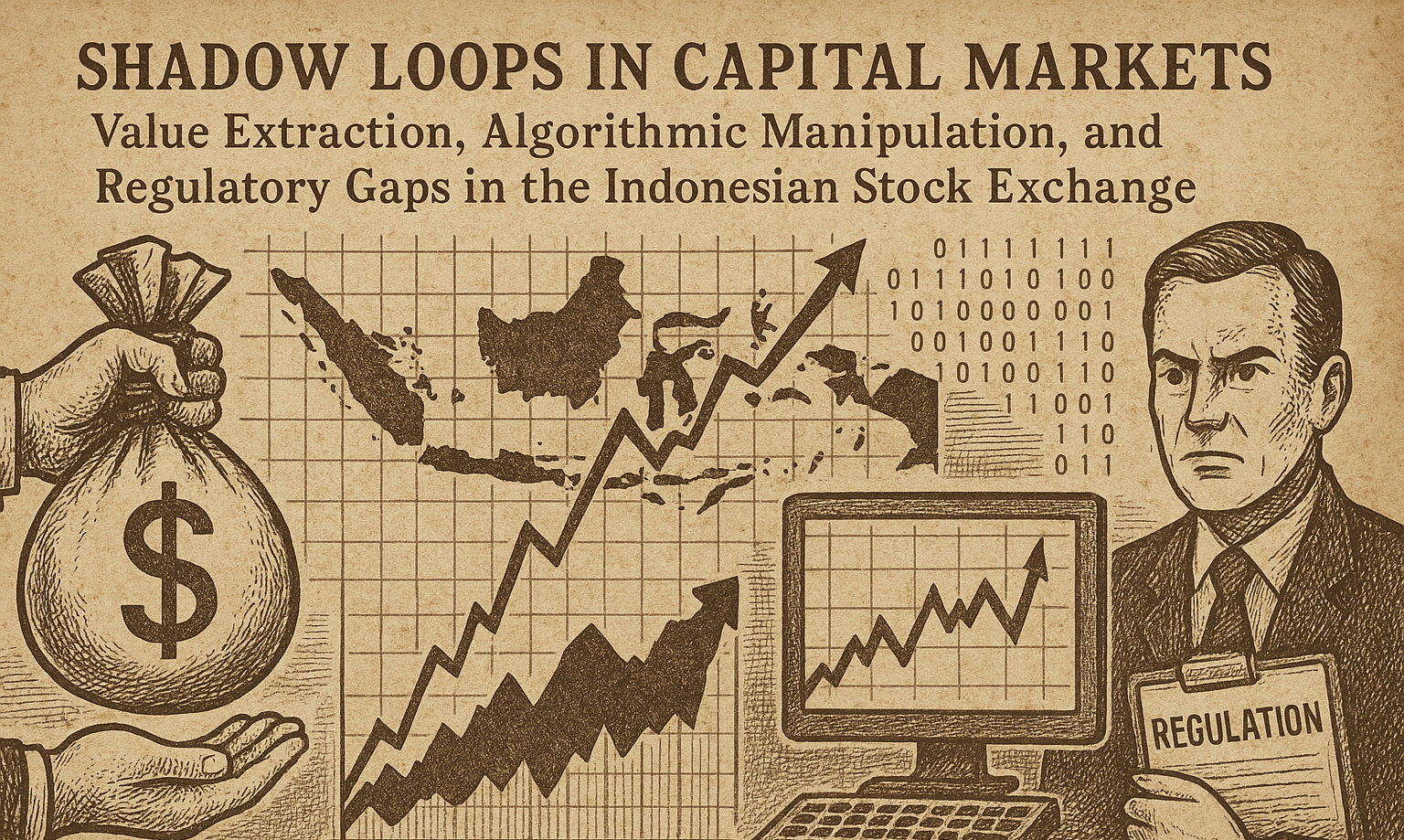Insights
Expert research, macroeconomic analysis, and opinion pieces from our team of financial experts.

The Hidden Trigger: How Japan's Carry Trade Bubble Could Unleash the Next Global Shock
Japan's transition from the world's primary source of cheap funding to monetary normalization represents the most significant underpriced tail risk in global financial markets. After three decades of ultra-accommodative policy that transformed the yen into the foundation of global leverage, the Bank of Japan (BOJ) faces mounting pressure to normalize rates amid persistent inflation above target and political backlash against currency weakness. This policy pivot threatens to trigger an unwinding of carry trade positions estimated between $1-4 trillion, with the potential to destabilize markets far beyond traditional currency channels. The systemic importance of this risk stems from three interconnected factors. First, Japan's unique position as the world's largest creditor nation with $3.4 trillion in net foreign assets means that capital repatriation would drain liquidity from global markets on an unprecedented scale. Second, the multi decade stability of Japan's zero-rate policy has created deeply embedded market structures and risk models that systematically underestimate the probability and impact of a regime change. Third, modern financial markets have created hidden linkages between yen funding and seemingly unrelated asset classes, from U.S. technology stocks to emerging market debt, amplifying contagion channels. The August 2024 episode provided a preview of this vulnerability. A modest 15 basis point BOJ rate hike triggered a 10% yen appreciation, a 12% Nikkei plunge, and synchronized selling across global risk assets. Critically, this unwinding was only partial speculative positioning data suggests 50-60% of positions remained intact, leaving substantial dry powder for future volatility. Unlike the Swiss franc, which serves a niche role constrained by active central bank intervention and limited market depth, the yen's systemic importance makes its normalization a global event that no single policy authority can control

No One Wins Forever: Unpacking Game Theory and the Real Rules of Financial Competition
This article explores how game theory reveals the hidden logic behind competition in modern markets, showing that no business, no matter how dominant can win forever. Using Southeast Asian case studies like e-commerce price wars and ride-hailing battles, it explains how every strategic move triggers reactions, leading to cycles of adaptation, temporary advantage, and eventual equilibrium. The article unpacks practical concepts like the Red Queen Effect, Nash Equilibrium, the Prisoner’s Dilemma, first-mover advantage, and kingmaker dynamics offering actionable insights for investors, entrepreneurs, and decision-makers on how to survive and thrive in an ever-shifting business landscape where resilience, adaptation, and strategic thinking matter more than any single “winning” move.

Navigating Turbulence: Trump's Tariff Volatility Meets the Digital Dollar Revolution
This article analyzes the paradoxical financial environment of 2025, where erratic U.S. tariff policies under President Trump have triggered significant market volatility and disrupted global trade, especially impacting Asian economies. Simultaneously, the advancement of the GENIUS Act signals a transformative push toward regulated Treasury-backed stablecoins, promising to reinforce U.S. dollar dominance through digital currency innovation. This dual dynamic creates a complex interplay of risks and opportunities, urging Asian policymakers and investors to strategically navigate tariff-induced uncertainty while leveraging emerging digital financial technologies to foster economic resilience, financial inclusion, and technological leadership in a rapidly evolving global monetary landscape.

From Tariffs to Rate Cuts: How the US-China Trade Reset Shapes Global Markets
This article analyzes the 2025 trade truce between the U.S. and China reducing tariffs to 30% and 10% respectively and its broader implications for global markets, monetary policy, and investor behavior. While the de-escalation offers temporary relief, the paper argues that underlying economic fragility persists, with sluggish growth forecasts, sticky inflation, and a growing disconnect between market optimism and fundamentals. It further explores how reduced expectations for Federal Reserve rate cuts (from 75bps to ~56bps) reflect this uncertainty, and provides scenario-based outlooks for the remainder of 2025, offering strategic investment insights amidst a complex, policy-driven environment.

The Debt-Driven Storm: Applying Ray Dalio's Crisis Blueprint to Navigate the 2025 Market Crossroads
In a complex world facing persistent inflation, escalating geopolitical tensions, and increasingly fragile credit systems, Ray Dalio's comprehensive macro frameworks offer invaluable insights for anticipating potential economic paths. By applying Dalio's theories on debt cycles, the economic machine, and shifting world orders, this analysis provides strategic perspectives on the 2025 market landscape and delivers actionable guidance for investors, policymakers, and thought leaders navigating through unprecedented uncertainty.

REFLEXIVITY RELOADED: APPLYING GEORGE SOROS' THEORY IN TODAY'S MARKETS
This article revisits George Soros’s theory of reflexivity, which argues that market participants’ perceptions influence prices, and those prices, in turn, reshape economic fundamentals, forming a feedback loop. Far from outdated, the theory proves crucial in today’s volatile markets dominated by algorithmic trading, social media narratives, and institutional herding. The piece examines how fallibility, reflexivity, and perception-driven cycles create boom-bust patterns, as seen in recent events like the meme stock frenzy and the ongoing AI investment cycle. It introduces a Reflexive Investor’s Toolkit for mapping market narratives, spotting opportunities, and detecting risks. Finally, it expands the concept beyond finance into monetary policy, consumer confidence, and innovation ecosystems arguing that reflexivity provides a powerful framework for navigating modern uncertainty and complexity in both markets and policymaking.

This article dissects the anatomy of systemic value extraction in Indonesia's capital markets through a detailed examination of financial engineering mechanisms that exploit regulatory deficiencies. The Indonesian Stock Exchange (IDX) has become an arena where sophisticated actors manipulate market structures through concentrated shareholding, offshore collateralization, and algorithmic trading strategies. These practices create dangerous feedback loops that disconnect stock valuations from underlying fundamentals, undermine market integrity, and ultimately transform capital markets from engines of economic growth into tools for value extraction. The phenomenon of "saham gorengan" (artificially inflated stocks) is particularly prevalent in low-float securities where price manipulation is facilitated by thin trading volumes and concentrated ownership. By analyzing the structural mechanisms of manipulation, algorithmic trading strategies, and regulatory frameworks, this article identifies critical enforcement gaps and proposes strategic reforms necessary to restore market integrity and realign capital markets with their intended economic purpose. The analysis draws on concrete cases from Indonesia and international markets, including the Jiwasraya scandal, Archegos collapse, and numerous instances of low float manipulation schemes that have severely impacted market integrity.

Shock Into Strategy: Indonesia's Economic Response to the 2025 Global Tariff Escalation
The recent implementation of the United States' universal and targeted tariffs has triggered unprecedented disruption in global trade dynamics, necessitating swift and strategic policy responses from export-oriented economies. This paper analyzes Indonesia's economic exposure to this "Global Tariff Shock 2025" and evaluates potential policy pathways to mitigate negative impacts while strengthening long-term economic resilience. Our analysis indicates that Indonesia's vulnerability extends beyond direct export exposure to the United States (9.8% of exports) to encompass broader systemic risks including global demand contraction, capital flight, and value chain disruptions. Through quantitative modeling and scenario analysis, we demonstrate that a coordinated dual approach combining export market diversification with domestic fiscal stimulus through tax-side interventions offers the most favorable balance of short-term stabilization and long-term resilience. Key findings suggest that reallocating 10-15% of non-mandatory government expenditure toward targeted tax cuts could activate domestic consumption without increasing sovereign debt, while strategic export diversification toward emerging markets could halve projected GDP losses. This paper outlines a comprehensive policy framework to transform external shock into structural opportunity, emphasizing the importance of maintaining Indonesia's strategic economic autonomy in an increasingly fragmented global trade environment.